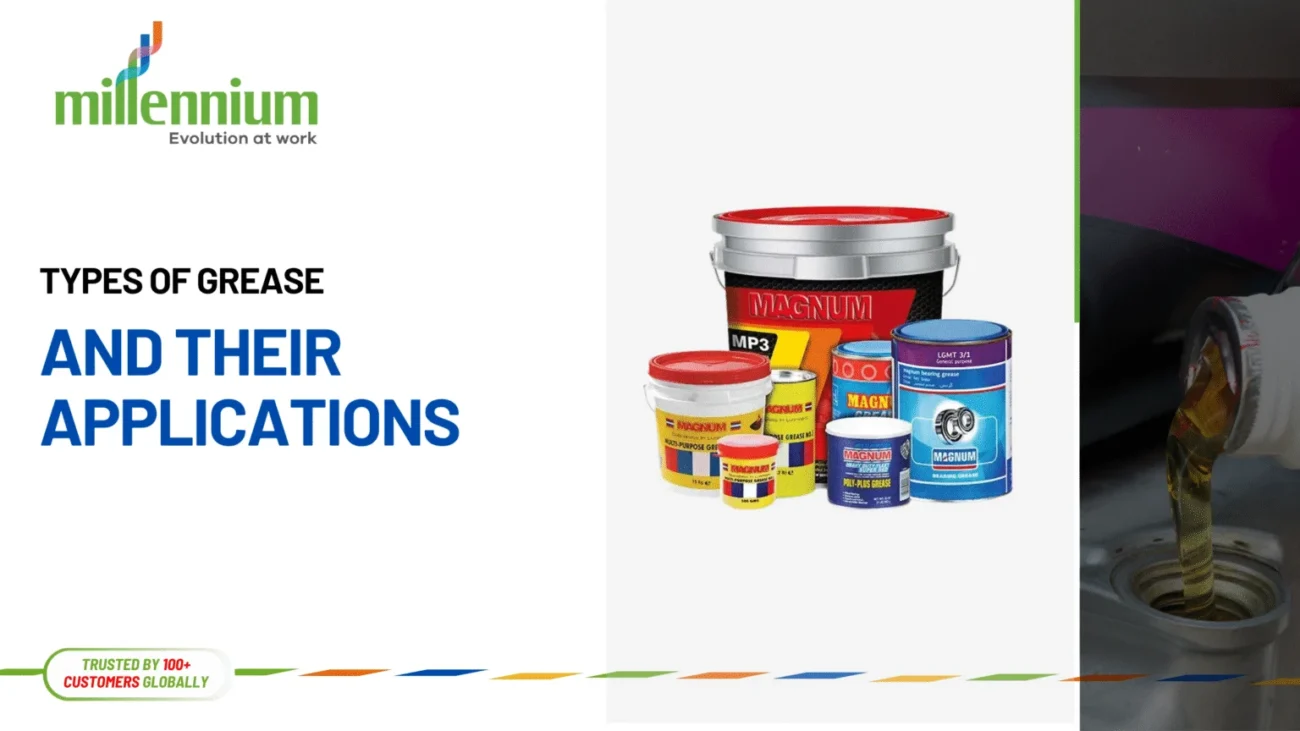Introduction
Grease is one of the most widely used lubricants in industries and automotive applications, playing a crucial role in reducing friction, preventing wear, and extending the life of machinery. Unlike oils, which flow freely, grease is semi-solid and can stay in place even under high pressure, temperature variations, or when equipment is idle. This makes it especially useful for applications where continuous lubrication is not possible. Choosing the right type of grease is critical for ensuring efficient performance, minimizing downtime, and protecting components against damage.
What is Grease?
Grease is a semi-solid lubricant made from three key components: a base oil, a thickener, and performance-enhancing additives. The base oil (either mineral or synthetic) provides the main lubricating properties. The thickener, which can be soap-based (such as lithium or calcium) or non-soap-based (such as clay or polyurea), gives grease its consistency and ability to stay in place. Finally, additives are included to improve resistance to oxidation, corrosion, and wear.
Grease is particularly useful in situations where liquid lubricants would leak out or fail to provide adequate protection, such as in wheel bearings, gears, electric motors, and heavy machinery.
Common Grease Types
Different types of grease are formulated to suit specific conditions and applications. Some of the most common types include:
- Calcium Grease – Known for excellent water resistance and good mechanical stability, calcium grease is best suited for wet environments. However, it has a lower operating temperature range compared to other greases.
- Lithium Grease – The most widely used grease, lithium-based formulations offer excellent temperature tolerance, water resistance, and mechanical stability. They are versatile and used across automotive, industrial, and household applications.
- Polyurea Grease – This grease is favored for its long service life and excellent resistance to oxidation and water washout. It is often used in electric motors, pumps, and sealed-for-life bearings.
- Aluminum Complex Grease – With strong water resistance and excellent corrosion protection, this grease is used in the food industry (in its food-grade version) and in marine applications.
- Clay-Based (Bentone) Grease – A non-soap thickened grease with outstanding high-temperature stability. It does not melt, making it ideal for applications that run under continuous high heat.
- Sodium Grease – Offers good mechanical stability and rust protection but has poor water resistance, which limits its use in wet conditions.
- Synthetic Grease – Formulated using synthetic base oils, synthetic greases offer superior performance across extreme temperatures, high loads, and demanding industrial environments.
Calcium Grease vs Lithium Grease
Two of the most commonly compared greases are calcium grease vs lithium grease.
- Calcium Grease:
- Advantages: Excellent water resistance, cost-effective, suitable for wet conditions.
- Limitations: Poor high-temperature performance, generally limited to -20°C to 60°C.
- Applications: Marine equipment, agricultural machinery, water pumps, and chassis lubrication.
- Lithium Grease:
- Advantages: High temperature tolerance (up to 120°C or higher), good water resistance, excellent mechanical stability, and multipurpose use.
- Limitations: Slightly more expensive than calcium grease.
- Applications: Automotive wheel bearings, industrial machinery, electric motors, and heavy-duty equipment.
In summary, calcium grease is ideal for wet and moderate-temperature environments, while lithium grease is more versatile and suitable for a broader range of conditions.
How to Choose the Right Grease
Selecting the right grease for your application depends on several factors:
- Operating Temperature – Check whether the grease can handle the minimum and maximum temperatures of your application. For high-temperature applications, lithium complex or clay-based greases are ideal.
- Water Exposure – If equipment is exposed to water or moisture, calcium or aluminum complex grease is recommended for their strong water resistance.
- Load and Speed – Heavy loads and slow speeds require grease with high load-carrying capacity (such as molybdenum disulfide grease), while high-speed applications (like electric motors) need low-friction greases such as polyurea.
- Environment – For food-grade or pharmaceutical applications, only NSF-approved greases are suitable to ensure safety. In marine environments, anti-corrosion and water-resistant greases are preferred.
- Compatibility – Mixing different grease types can cause separation or performance loss. Always check compatibility charts before switching from one grease type to another.
Types of Grease Comparison
| Grease Type | Temperature Range | Water Resistance | Best Applications |
|---|---|---|---|
| Calcium Grease | -20°C to 60°C | Excellent | Marine, agriculture, wet environments |
| Lithium Grease | -30°C to 120°C | Good | Automotive, industrial, multipurpose use |
| Polyurea Grease | -20°C to 140°C | Excellent | Electric motors, sealed bearings |
| Aluminum Complex Grease | -20°C to 150°C | Excellent | Food-grade, marine, corrosion protection |
| Clay-Based Grease | -20°C to 180°C+ | Moderate | High-temperature machinery, furnaces |
| Sodium Grease | -20°C to 120°C | Poor | Industrial equipment (dry environments only) |
| Synthetic Grease | -40°C to 200°C | Excellent | Aerospace, extreme industrial applications |
This comparison makes it easier to identify the right grease for specific working conditions.
Conclusion
Grease is an indispensable lubricant in modern machinery, providing protection against friction, wear, corrosion, and environmental factors. With various types available, each formulated to serve specific conditions, selecting the correct grease is essential for equipment reliability and efficiency. Calcium grease is best suited for wet conditions at moderate temperatures, while lithium grease offers a versatile solution for automotive and industrial use. Other specialized greases like polyurea, aluminum complex, and synthetic greases ensure superior performance in demanding environments. By carefully considering factors such as temperature, load, water exposure, and industry requirements, businesses and individuals can maximize machinery performance and extend equipment life.
